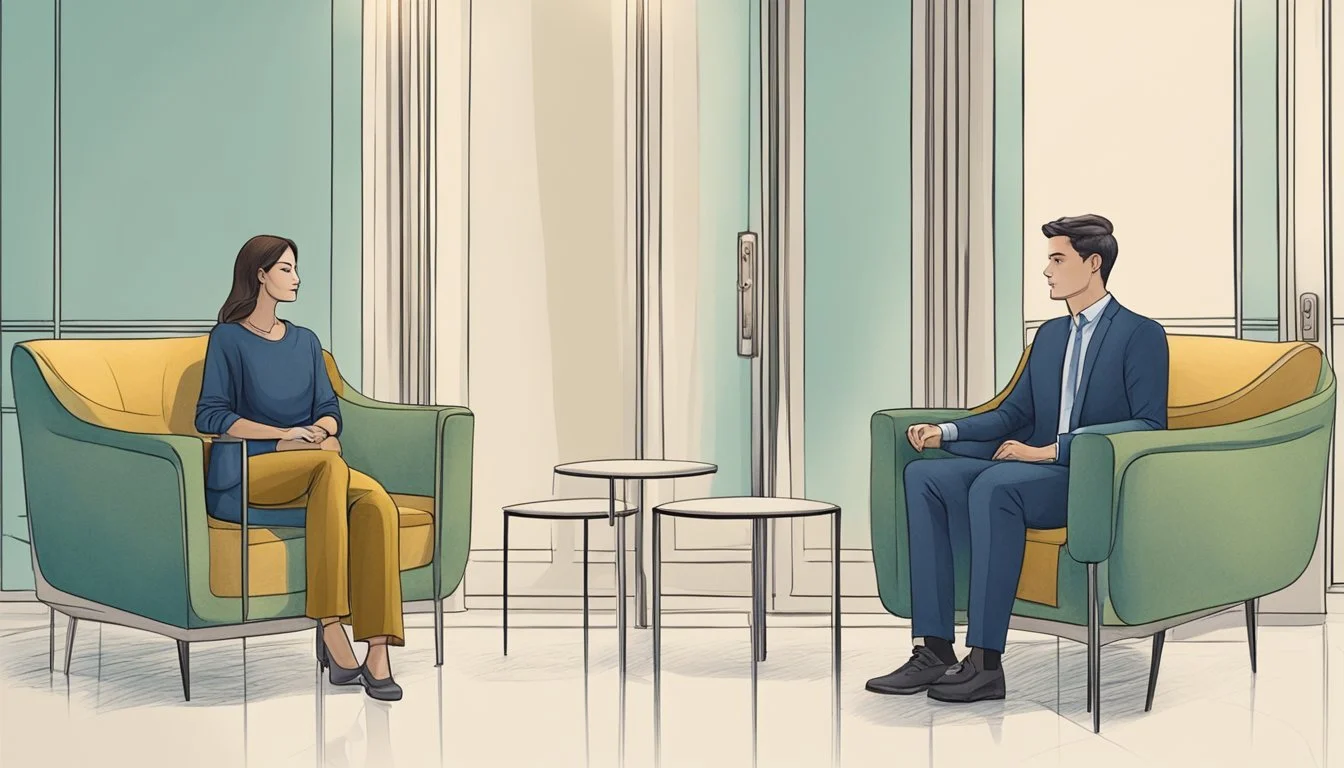9 Reasons Why Mutual Respect for Privacy is Essential in a Healthy Relationship
Key to Trust and Harmony
In a healthy relationship, privacy is often an overlooked yet crucial component. Many people underestimate its importance, viewing it as something that signifies separation rather than a foundational element of mutual respect.
Mutual respect for privacy allows partners to maintain their individuality while fostering a deeper connection. This respect helps ensure that personal boundaries are upheld, which is vital for both partners' emotional and psychological well-being.
1) Foundation for Trust
Trust forms the cornerstone of any healthy relationship. Mutual respect for privacy is a key element in building this trust. When partners respect each other's need for personal space and autonomy, it creates an environment where trust can flourish.
Being consistent and following through on commitments enhance trust. This commitment demonstrates reliability, helping both partners to feel secure in the relationship. In turn, this security deepens their connection and trust.
Empathetic listening strengthens trust further. By being present and listening without judgment, partners show they value each other’s perspectives. This form of respect encourages open communication, leading to stronger trust.
Mutual respect for privacy also helps prevent feelings of suffocation. When each partner has the freedom to pursue personal interests and maintain a sense of autonomy, it alleviates unnecessary pressures. This respect preserves the relationship's health, allowing trust to grow naturally.
Vulnerability is another critical aspect. Sharing fears and insecurities deepens intimacy and fosters trust. When partners feel safe to express their true selves, the relationship benefits from increased honesty and connection.
By embracing these principles, relationships are better positioned to thrive, rooted in a foundation of mutual respect and trust.
2) Emotional Security
Emotional security is crucial in any healthy relationship. A stable environment where both partners feel safe to express their feelings without fear of judgment is essential.
Creating emotional security involves setting clear boundaries. Honoring what's important to each partner fosters a sense of safety and respect.
Giving the benefit of the doubt can strengthen this security. Trusting that your partner has good intentions reduces unnecessary conflicts.
Mutual respect for privacy contributes to emotional security. Allowing each person to have personal space and time alone can prevent feelings of suffocation.
Authenticity plays a significant role in emotional security. When partners are genuine and predictable, it builds trust and reduces anxiety.
Emotional safety also includes sharing personal information gradually. Rash decision-making can undermine trust and security in the relationship.
Both partners need to protect their time by not overcommitting. This ensures that they can maintain a balanced and respectful relationship.
3) Maintains Independence
Respecting privacy in a relationship is key to maintaining personal independence. Each person needs space to explore their interests and hobbies.
Having time apart can enrich the relationship. Both partners can come back to each other with fresh perspectives and experiences.
Personal achievements and goals are crucial for individual growth. Respecting privacy allows each person to pursue their ambitions without feeling compromised.
Independence fosters a sense of self-worth. When partners feel trusted and respected, they are more likely to contribute positively to the relationship.
Giving each other room to breathe prevents feelings of suffocation. Maintaining personal boundaries ensures that both partners feel comfortable and secure.
Autonomy in a relationship promotes healthy interactions. It allows both individuals to express themselves freely and maintain their unique identities.
Mutual respect for privacy leads to a balanced relationship. It helps both partners to feel valued and understood, enhancing the overall harmony.
Knowing when to step back and allow your partner their own space is essential. It prevents over-dependence and encourages mutual appreciation.
Learn more about trust and privacy in a healthy relationship.
4) Prevents Resentment
Resentment can build up when one partner feels their privacy is not respected. When boundaries are disregarded, individuals may feel unvalued or taken for granted. This sense of disrespect can lead to deep-seated bitterness over time.
Setting clear boundaries helps each partner understand and acknowledge each other's needs. By respecting these boundaries, partners show they value each other’s personal space and autonomy. This mutual respect fosters a positive atmosphere in the relationship.
Moreover, respecting privacy allows partners to maintain their own identities. This independence is crucial in preventing feelings of suffocation and loss of self, which can contribute to resentment. When both parties feel secure in their individuality, they are less likely to harbor negative feelings.
If a partner regularly invades the other's privacy, small annoyances can quickly turn into larger issues. Addressing and respecting privacy concerns early on can mitigate these risks, ensuring a healthier and more balanced relationship.
Couples that prioritize privacy are better equipped to handle conflicts constructively. When personal boundaries are acknowledged and respected, it demonstrates a commitment to the relationship’s health and longevity, reducing the likelihood of resentment building up.
Learn more about the importance of privacy and respecting boundaries in relationships on Marriage.com and Verywell Mind.
5) Encourages Open Communication
Mutual respect for privacy in a relationship sets a foundation for open communication. When partners trust each other to respect their personal space, they feel more comfortable sharing their thoughts and feelings.
This respect means being listened to without fear of judgment. Partners are more likely to express themselves honestly when they know their boundaries are acknowledged.
Open communication allows both individuals to discuss and work through issues together. It creates an environment where feedback is actively received and valued.
According to Marriage.com, such boundaries support mutual respect and personal growth.
Respecting privacy ensures that each partner feels secure. This security fosters a willingness to engage in meaningful conversations, strengthening the bond between them.
6) Promotes Honesty
Mutual respect for privacy in a relationship encourages honesty between partners. When individuals feel secure in their personal space, they are more likely to express their true thoughts and feelings. This openness builds a foundation where partners can share their needs and concerns without fear of judgment.
When privacy is valued, it creates an environment where secrets are less likely to form. Partners trust that their personal boundaries will be respected, which in turn fosters transparency. Honest communication becomes a staple in the relationship, reducing misunderstandings and promoting a deeper connection.
Additionally, respecting privacy reduces the pressure to constantly share every detail of one's life. This balance allows each person to decide when and how to communicate significant matters, leading to more meaningful and authentic conversations. When people feel their privacy is respected, they are more likely to be honest about even the most difficult topics.
7) Supports Individual Growth
Respecting each other's privacy allows partners to pursue personal goals and interests. This fosters personal development and enriches the relationship.
Encouragement of individual achievements and dreams leads to mutual respect and admiration. It helps partners grow together without losing their sense of self.
Maintaining individuality can prevent dependency and build a stronger, more resilient partnership. Trust and privacy are crucial in this dynamic.
By respecting each other's need for privacy, partners show that they value their significant other's personal space and growth.
Such support can lead to higher personal satisfaction and a healthier relationship. It’s about balancing togetherness with personal freedom and growth.
Regular communication about personal needs and boundaries enhances understanding and respect. This can be vital for long-term relationship success.
Overall, supporting individual growth through mutual respect for privacy enhances not only personal well-being but also the strength of the relationship.
8) Strengthens Bond
Respecting each other's privacy plays a crucial role in strengthening the bond within a relationship. It shows that both partners trust and value one another, leading to a deeper sense of connection.
When individuals feel their privacy is respected, they are more likely to open up about their thoughts and feelings. This openness fosters a sense of intimacy that can fortify the relationship.
Maintaining privacy also allows partners to have personal space, which is necessary for personal growth. This autonomy can lead to a healthier relationship where both individuals feel fulfilled and supported.
By setting and respecting boundaries, partners demonstrate mutual respect. This mutual respect can strengthen the emotional ties that hold the relationship together.
Protecting each other's privacy helps prevent feelings of suffocation and control. It fosters a healthy environment where both partners feel free to be themselves.
Respecting privacy can also contribute to the stability of the relationship. Knowing that personal boundaries will be honored creates a sense of security and trust.
Ultimately, a balance of trust and privacy plays a key role in developing and maintaining a strong bond. This balance can lead to a more resilient and enduring relationship.
9) Reduces Conflicts
Respecting each other's privacy in a relationship significantly reduces conflicts. When both partners understand and honor each other's need for personal space, misunderstandings and disputes over boundaries are less likely to occur.
Couples who respect privacy are better able to avoid arguments stemming from feelings of suffocation. Allowing personal space helps maintain individual autonomy, reducing the chances of small issues escalating into larger conflicts.
Privacy also fosters trust. When partners know their personal boundaries are respected, they feel more secure and less likely to accuse one another of invasive behavior. This trust helps in navigating disagreements calmly.
Observing privacy can prevent unnecessary blame and suspicion. By giving partners their own space and time, assumptions about their actions or intentions are minimized, leading to a more harmonious relationship environment.
Additionally, respecting privacy can help avoid repetitive arguments about the same issues. If one partner needs downtime to process emotions or thoughts, having that space can reduce the frequency of conflicts over unresolved feelings.
Lastly, honoring privacy can make it easier for couples to come back together and resolve issues more effectively. When partners have time to themselves, they can approach discussions with a clearer mind and a more composed disposition, facilitating healthier communication.
Understanding Mutual Respect for Privacy
Mutual respect for privacy in relationships involves acknowledging and honoring each other's boundaries while maintaining an independent sense of self. It is crucial for establishing trust and facilitating open, honest communication.
The Role of Boundaries in Relationships
Boundaries are essential in any relationship. They serve as guidelines for acceptable behavior and personal space, helping partners understand each other's limits. Respecting boundaries leads to a healthier, more balanced relationship.
When both partners clearly communicate their boundaries, it becomes easier to avoid conflicts and misunderstandings. Boundaries can include physical space, emotional limits, and expectations regarding personal time.
Maintaining boundaries allows partners to feel safe and secure. It ensures that neither person feels controlled or overwhelmed. Establishing and respecting these limits fosters mutual respect, enabling each partner to thrive individually and together.
Defining Privacy in a Modern Context
Privacy in relationships entails more than just personal space; it includes emotional and digital privacy. Each person has the right to keep certain thoughts, feelings, and activities private without fear of judgment or intrusion.
In today's digital age, respecting privacy extends to online interactions and use of technology. Trusting a partner not to invade social media accounts or personal messages is a significant aspect of mutual respect.
Honoring privacy is fundamentally about trust and respect. It allows partners to maintain their individuality and personal integrity. Ensuring privacy in various aspects helps in building a resilient and respectful partnership.
Communication and Trust Dynamics
Effective communication and trust form the backbone of a healthy relationship. Privacy plays a crucial role in maintaining both, ensuring mutual respect and fostering a deep sense of security between partners.
How Privacy Contributes to Trust
Trust hinges on the ability to respect each other's private spaces. By honoring privacy, individuals demonstrate faith in their partner’s autonomy and integrity. This leads to fewer misunderstandings and resentment, as each person feels secure in their individuality.
Respecting privacy also helps prevent the unnecessary intrusion that can erode trust over time. Healthy boundaries allow partners to express themselves freely without fear of judgment or surveillance. This mutual respect builds a foundation where trust can thrive, as each person knows their private thoughts and activities are safe.
Furthermore, the ability to keep certain aspects of life private encourages transparency in areas that matter most. When privacy is prioritized, partners are more likely to open up about sensitive issues because they trust their confidences won't be violated. This balance of privacy and openness solidifies the trust essential for a lasting relationship.
Effective Communication Strategies
Open and honest communication is vital for maintaining trust and ensuring that partners' privacy is respected. Clear guidelines and discussions about boundaries help both partners understand what is acceptable and what is not, reducing the risk of conflict.
Active listening is another key strategy. When partners genuinely listen to each other's needs and concerns, they validate their feelings, fostering a climate of trust and understanding. This involves not just hearing words but also recognizing the emotions behind them.
Regular check-ins can be beneficial. Scheduling dedicated time to discuss any issues or concerns about privacy and boundaries ensures that both partners are on the same page. It also provides an opportunity to adjust boundaries as the relationship evolves.
Utilizing “I” statements helps in expressing feelings without sounding accusatory. For example, saying “I feel uncomfortable when…” sets a non-threatening tone for difficult conversations. This way, privacy and personal space can be negotiated respectfully, further enhancing the trust dynamics within the relationship.







